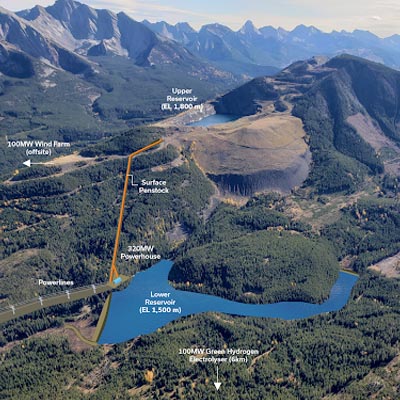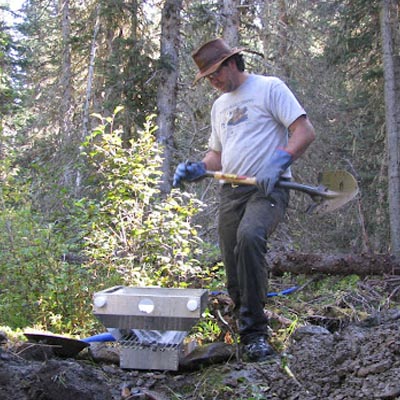Yellowknife’s Mine Training Society gets $5.8 million in funding

1 of 4Underground Miner students participating in a familiarization trip at Ekati Mine, owned by Dominion Diamond Corporation. — Photo courtesy Mine T
1 of 4Underground Miner students participating in a familiarization trip at Ekati Mine, owned by Dominion Diamond Corporation. — Photo courtesy Mine Training Society
The Mine Training Society in the Northwest Territores celebrated its 10th anniversary this year and also had a visit from Prime Minister Stephen Harper.
On August 20 Harper announced $5.8 million in funding for the society's Mining the Future initiative at a special event in Hay River.
Since its inception in 2003, the Mine Training Society (MTS) has evolved into much more than a vehicle for delivering training programs. Its staff helps evaluate, train and then place Northerners in mining and mining-related jobs, and also provides hands-on mentoring and job coaching to its clients throughout their careers.
The Mine Training Society first arose from the a ministerial ad hoc committee created to advise the Minister of Education, Culture and Employment as part of the development of initial diamond mine projects in the Northwest Territories. Since 2004 it has served over 1900 individual Northerners with training and/or career counselling and has placed over 830 of them in high-paying and fulfilling jobs.
Over the course of its existence, MTS has been recognized for its work on several occasions, most notably receiving the 2009 Premier’s Award in Excellence in Collaboration from the government of the Northwest Territories and the 2012 Special Achievement Award for outstanding contributions to the mineral industry from the Prospectors and Developers Association of Canada.
Hilary Jones, general manager of MTS, said the new funding for the Mining the Future program will be put to good use.
"I was thrilled to death," she said. "We actually officially signed the agreement on February 28, but were not allowed to say anything until the federal government decided to announce it. We started working the day we signed the agreement. It was so nice to have the Prime Minister in the community of Hay River to announce training in our own backyard. It was nice to be able to celebrate our success."
Mining the Future is a program designed by MTS to ensure that the Northwest Territories’ aboriginal population can fully take part in the oncoming burst of new mining activity in the Northwest Territories.
With three active mines in the territory already employing an estimated 2,935 people and multiple mining projects well into development, there is a jobs boom coming to the territory. By 2017, it’s expected that there will be nearly 5,000 mining positions available and another 9,000 support or indirect jobs. That’s some 14,000 employment opportunities in the Northwest Territories in less than a decade.
As well, the territory's currently active mines—Diavik, Ekati and Snap Lake—are expected to reach the end of their lifespan over the next 10 to 15 years, providing another source of employment opportunities as reclamation and remediation activities kick into gear.
"It's a challenge for us, as we initially designed Mining the Future to be a 30 month project and it's now a 24 month project," said Jones. "But we'll still have the same outcome. So we literally hit the ground running back in February, starting with programming.
"We have developed an introduction to underground mining, which is also a career exploration program in different aboriginal communities. We also have a heavy equipment operator program, a geoscience field assistant program, mineral processing operator program, underground miner training and so much more."
Another new and exciting initiative Jones is excited about is a fund to help aboriginal people get a legal pardon or record suspension, as a criminal record can be a barrier to employment.
"Back in the 1960s and 70s, a massive amount of aboriginal people were encouraged to plead guilty by their defense lawyers for small crimes," said Jones. "It created a whole group of folks with criminal records that shouldn't have them. At one point, 75 per cent of our trainees had criminal records. It's insane. So we identified that as a huge barrier for employment and are now working with the fund to get these people their pardon. Our territorial government is assisting through its social assistance program, so they're helping to pay for this as well."
The Mining the Future program will run through to March 31, 2015, by which time staff will have seen 400 people, trained 260 and found employment for 250.
"We are well on our way to doing that," said Jones. "From February 28 to September 3 we've already assessed and worked with 266 people and worked on their action plan; 24 are employed, 43 are in their criminal records process and three have gone back to post-secondary education. It's quite amazing."
Jones said the Mine Training Society is changing people's lives, every day.
"I like to think we are creating a new society, because people are becoming employed," said Jones. "Families are finally having opportunities for economic success that they didn't have before, especially with accessing education."




